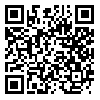Volume 13, Issue 6 (Nov & Dec 2023)
J Research Health 2023, 13(6): 417-426 |
Back to browse issues page
Download citation:
BibTeX | RIS | EndNote | Medlars | ProCite | Reference Manager | RefWorks
Send citation to:



BibTeX | RIS | EndNote | Medlars | ProCite | Reference Manager | RefWorks
Send citation to:
Sarani M, Heydari A, Isfahani P. Investigating the Effects of Educational Intervention Based on the Health Belief Model in Adopting Healthy Behaviors by Type 2 Diabetic Patients in 2021. J Research Health 2023; 13 (6) :417-426
URL: http://jrh.gmu.ac.ir/article-1-2158-en.html
URL: http://jrh.gmu.ac.ir/article-1-2158-en.html
1- Department of Public Health, School of Public Health, Zabol University of Medical Sciences, Zabol, Iran.
2- Department of Health Services Management, School of Public Health, Zabol University of Medical Sciences, Zabol, Iran. ,p.isfehani@gmail.com
2- Department of Health Services Management, School of Public Health, Zabol University of Medical Sciences, Zabol, Iran. ,
Abstract: (1705 Views)
Background: The essential strategies to avoid diabetes complications are lifelong health education and self-care. This study determines the impacts of an educational intervention based on a health belief model.
Methods: This quasi-experimental study was conducted on patients with type 2 diabetes using convenience sampling. They were randomly assigned to experimental (n=55) and control groups (n=55). A standard questionnaire was used to collect the data. The healthy behaviors were measured again after 3 and 6 months, and the data analysis was performed using the SPSS software, version 20.
Results: The mean value of perceived susceptibility boosted in the intervention group from 18.94 before the training to 22.90 and 22.3 after 3 and 6 months of the intervention, respectively. The mean score perceived severity increased in the intervention group to 31.30 and 31.42 after 3 and 6 months of the intervention, respectively. Meanwhile, the mean score of perceived benefits increased in the intervention group from 10.06 before the training to 11.61 and 13.32 after 3 and 6 months of the intervention, respectively. The mean score of perceived barriers decreased in the intervention group from 19.50 before the training to 13.35 and 12.21 after 3 and 6 months of the intervention, respectively. The mean score of perceived self-efficacy boosted in the intervention group from 24.16 before the training to 29.44 and 29.48 after 3 and 6 months of the intervention, respectively. The mean value of cues to action boosted in the intervention group from 20.15 before the training to 22.2 and 23.2 after 3 and 6 months of the intervention, respectively.
Conclusion: The results demonstrated the importance of designing educational programs based on the health belief model constructs over 3 and 6 months in adopting healthy behaviors by subjects with type 2 diabetes.
Corresponding author: Parvaneh Isfahani, Email: p.isfehani@gmail.com
You can also search for this author in: PubMed, Google Scholar
Methods: This quasi-experimental study was conducted on patients with type 2 diabetes using convenience sampling. They were randomly assigned to experimental (n=55) and control groups (n=55). A standard questionnaire was used to collect the data. The healthy behaviors were measured again after 3 and 6 months, and the data analysis was performed using the SPSS software, version 20.
Results: The mean value of perceived susceptibility boosted in the intervention group from 18.94 before the training to 22.90 and 22.3 after 3 and 6 months of the intervention, respectively. The mean score perceived severity increased in the intervention group to 31.30 and 31.42 after 3 and 6 months of the intervention, respectively. Meanwhile, the mean score of perceived benefits increased in the intervention group from 10.06 before the training to 11.61 and 13.32 after 3 and 6 months of the intervention, respectively. The mean score of perceived barriers decreased in the intervention group from 19.50 before the training to 13.35 and 12.21 after 3 and 6 months of the intervention, respectively. The mean score of perceived self-efficacy boosted in the intervention group from 24.16 before the training to 29.44 and 29.48 after 3 and 6 months of the intervention, respectively. The mean value of cues to action boosted in the intervention group from 20.15 before the training to 22.2 and 23.2 after 3 and 6 months of the intervention, respectively.
Conclusion: The results demonstrated the importance of designing educational programs based on the health belief model constructs over 3 and 6 months in adopting healthy behaviors by subjects with type 2 diabetes.
Corresponding author: Parvaneh Isfahani, Email: p.isfehani@gmail.com
You can also search for this author in: PubMed, Google Scholar
Type of Study: Orginal Article |
Subject:
● Health Education
Received: 2022/11/21 | Accepted: 2023/04/29 | Published: 2023/10/3
Received: 2022/11/21 | Accepted: 2023/04/29 | Published: 2023/10/3
| Rights and permissions | |
 |
This work is licensed under a Creative Commons Attribution-NonCommercial 4.0 International License. |









